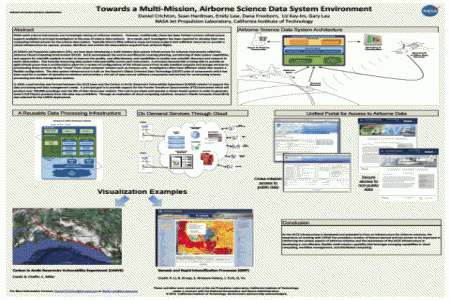NASA earth science instruments are increasingly relying on airborne missions. However, traditionally, there has been limited common infrastructure support available to principal investigators in the area of science data systems. As a result, each investigator has been required to develop their own computing infrastructures for the science data system. Typically there is little software reuse and many projects lack sufficient resources to provide a robust infrastructure to capture, process, distribute and archive the observations acquired from airborne flights.
At NASA’s Jet Propulsion Laboratory (JPL), we have been developing a multi-mission data system infrastructure for airborne instruments called the Airborne Cloud Computing Environment (ACCE). ACCE encompasses the end-to-end lifecycle covering planning, provisioning of data system capabilities, and support for scientific analysis in order to improve the quality, cost effectiveness, and capabilities to enable new scientific discovery and research in earth observation. This includes improving data system interoperability across each instrument. A principal characteristic is being able to provide an agile infrastructure that is architected to allow for a variety of configurations of the infrastructure from locally installed compute and storage services to provisioning those services via the “cloud” from cloud computer vendors such as Amazon.com. Investigators often have different needs that require a flexible configuration. The data system infrastructure is built on the Apache’s Object Oriented Data Technology (OODT) suite of components which has been used for a number of spaceborne missions and provides a rich set of open source software components and services for constructing science processing and data management systems.
In 2010, a partnership was formed between the ACCE team and the Carbon in Arctic Reservoirs Vulnerability Experiment (CARVE) mission to support the data processing and data management needs. A principal goal is to provide support for the Fourier Transform Spectrometer (FTS) instrument which will produce over 700,000 soundings over the life of their three-year mission. The cost to purchase and operate a cluster-based system in order to generate Level 2 Full Physics products from this data was prohibitive. Through an evaluation of cloud computing solutions, Amazon’s Elastic Compute Cloud (EC2) was selected for the CARVE deployment.



Comments
Poster